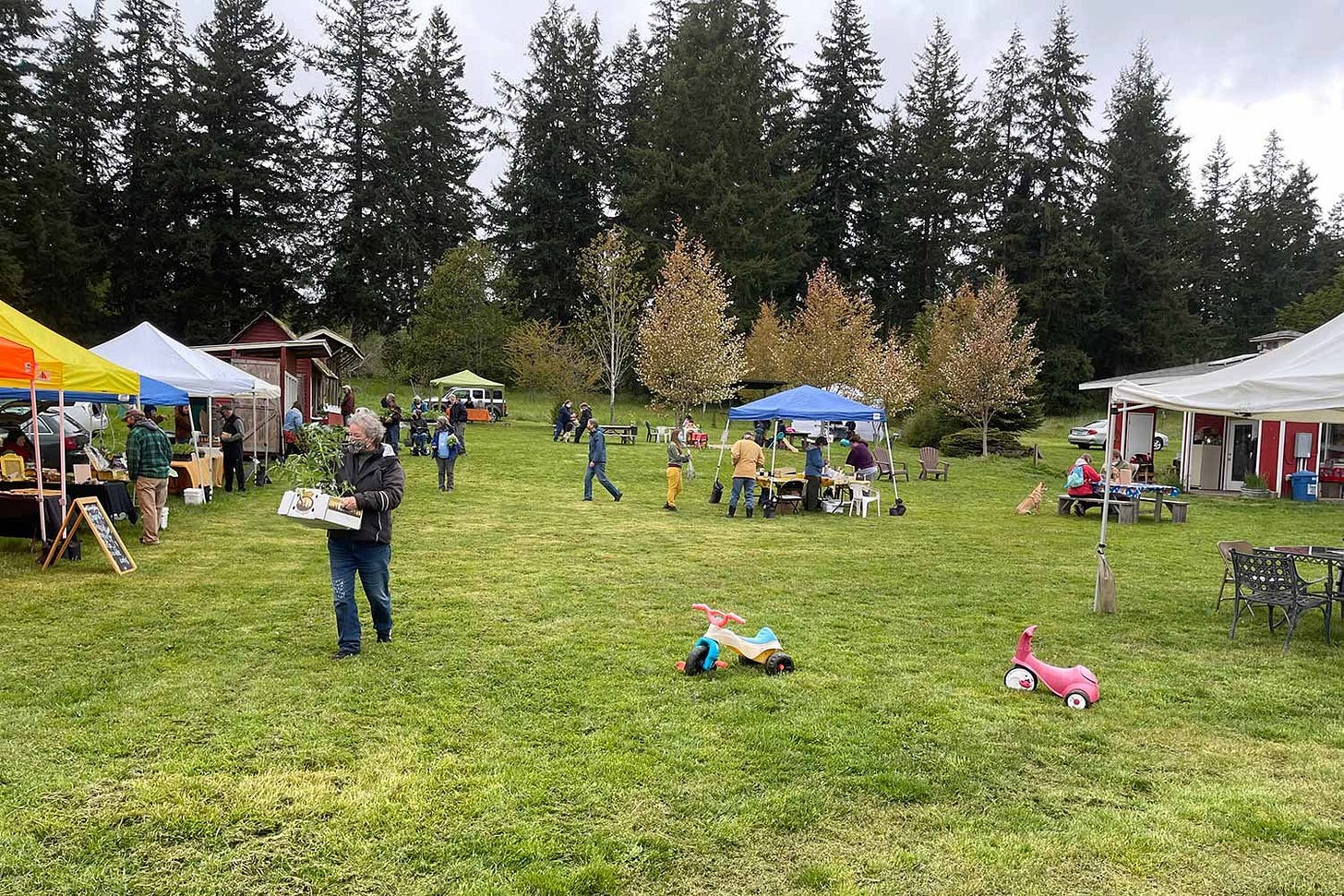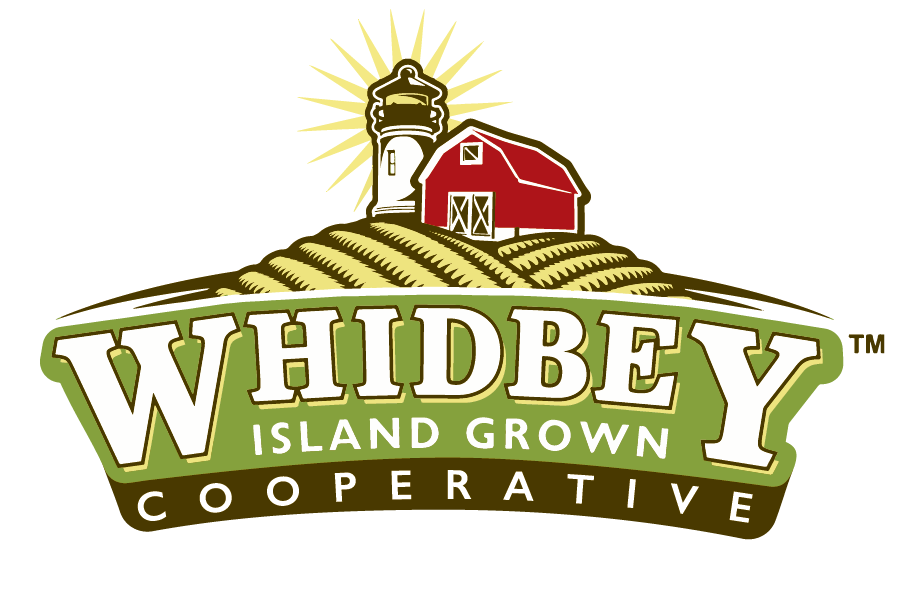Growing pains
Water and agriculture, the second in a series about water on an island
A couple of weeks ago, I introduced this series on water and my home island with a post about our aquifer. This week, as I teed up in last week's teaser post, we're going to take look at water and agriculture. The examples are local, but the issues are global.
Deeper posts like this take time to research and write. Your paid subscription helps me provide these posts as a service and keep them free for all to read.
In January, two farmers' groups asked me to speak on the availability of water for farming in the face of the pressures of climate change and development. The first was a presentation at South Whidbey Tilth's annual member meeting, and the second a class at a Farmers Forum organized by the Whidbey Island Grown Cooperative and held at The Organic Farm School.
Farmers' concerns about water are well-founded, as the July drought declaration is still in effect over most of Washington state. Our island’s reliance on groundwater from our aquifer has the short-term benefit of insulating us from the seasonal variations in rainfall and the year-to-year variations and climate change driven decline in snowpack that plague other counties, but it leaves us vulnerable in the longer term to the pressures of climate change and development.
What started as a presentation and a class on water for agriculture grew into a broader conversation on farming and its concerns, of which water is only one. In this post, we'll look at farming on the island, the issues farmers are facing, and the role the sponsoring organizations above and others are playing in finding and modeling local solutions that farming communities around the country and the world might learn from.
Farming on Whidbey
Rainfall, soil types, and aquifer recharge vary widely over the island, and all play a role in shaping the agricultural landscape.


Historial settlement patterns have played a role too. Let's take a look from north to south.
North Whidbey. The north end of the island has decent rainfall and good soil from post ice age riverbeds. The good pasture attracted dairy farmers from the province of Friesland in northern Holland. Some of their descendants are still farming, but these days more beef than dairy. In the 1930s the Navy bought part of the Clover Valley, which had some of best farmland, for a Naval Air Station. Firefighting foam from the base and an on-site landfill have contaminated ground and surface water in the Clover Valley and other areas, raising concerns about the safety of crops and livestock.
Central Whidbey is dominated by The Prairie, officially known as Ebey's Landing National Historical Reserve, which endeavors to "...preserve the historical, agricultural and cultural traditions of both Native and Euro-American..." This part of the island also has great soil left behind by post ice age rivers, but is rain shadowed by the Olympic Peninsula so has half the rainfall of the north and south ends. These factors helped Native Americans establish camas plantations here, mistaken for empty "green lawns" by early European explorers. Appropriated under the Doctrine of Discovery, and distributed through the Dominion Land Claim Act, much of this land is still farmed by the descendants of the first settlers. It's literally the breadbasket of the island with one farm growing and milling grain for bread baked locally that goes to the island's three school districts. I’ll come back to the Dominion Land Claim Act below, and you can read more about the history of the prairie in this post from last year.
South Whidbey is diverse, and that goes for the agriculture too. Back-to-the-landers, intentional community builders, hobby farmers, home producers, backyard chickens, wineries and distilleries, and homesteaders have all made a home and a contribution. I've written about some of the other communities we have here. That combination of small-scale farming and community activism has proven to be fertile soil for solutions to some of farming's pressures. Let’s first see what those pressures look like.
Homesteading
We need to have a word about homesteading as a cultural phenomenon. Something about it is deep in our psyche, even in the UK. Back there in 1975 as a newlywed in a boring corporate job, I was hooked on the sitcom The Good Life, featuring a couple who decided to give up the rat race to homestead in their suburban southwest London back yard. As I lived in the same town as one of the actors just two train stops from the show's location, that dream seemed all the more attainable, and it's been at the back of my mind ever since. So, I understand the visceral appeal. For people who grew up in the United States watching western movies and Little House on the Prairie, and in some cases with a family history of homesteading, that romantic notion is even more powerful.
But homesteading in the western United States has a troubled past. Several homesteading acts, or land grant laws, in the mid 1800s formalized the appropriation of Native American lands by white settlers. One such was the Donation Land Claim Act which covered Oregon Territory, an area that included what later became Washington State and, within it, Whidbey Island. The act stated:
[...] That to all white male citizens of the United States [...] emigrating to and settling in said Territory between the first day of December, eighteen hundred and fifty, and the first day of December, eighteen hundred and fifty-three, [...] there shall be, and hereby is, granted the quantity of one quarter section, or one hundred and sixty acres of land, if a single man; or if married, [...] the quantity of one half section, or three hundred and twenty acres, one half to the husband and the other half to the wife in her own right [...]. (Full text here.)
Black and indigenous Americans, with the exception of "half-breed Indians" were excluded, although married, but not unmarried, women could own land in their own name. 40 acres and a mule, the common shorthand for the post-civil war plan to redistribute confiscated enslavers land to formerly enslaved people, even if had happened as intended, and the later Southern Homestead Act of 1866, were regional phenomena, and did not apply to the west. The damage was done, and the legacy persists to this day in the overwhelmingly white ownership of farmland in the northwest.
This recent history still shapes life, farming, land use, and local politics. The original 160-acre quarter sections (160 acres is a quarter of a square mile, or about 0.65 km2) live on in mapping, zoning, agriculture, and land ownership and use. Many of the founding families are still major landowners and maintain an outsize influence on local politics. The 20 and 10 acres parcels that homesteaders are now buying are eighth and sixteenth subdivisions of those original quarter sections.
Legacy Problems
The legacy of the manner and pattern of settlement in the western United States has left us with many issues beyond the dispossession of Native Americans and the exclusion of African Americans discussed above. The ability under the homestead acts to claim ownership of land through "improving" it has tied the ability to farm to the ownership of land, at the same time as the resulting commodification of land has priced it out of reach of beginning farmers. Older farmers whose children aren't interested in farming have no succession plan and no one to sell to so that they can cash out and retire, leaving us with older farmers who can't quit and younger farmers who can't start. Land costs have contributed to another problem in helping make housing unaffordable.
Closely related to land ownership is the issue of water rights. Just as ownership of land could be claimed by improving it, a water right could be claimed by putting water to "beneficial use" on that land. The oldest water rights have seniority, "first in time, first in right", meaning that later junior water rights are the first to get cut off in times of drought. This further increases the cost of the land with senior rights, and further disadvantages beginning farmers.
These issues pale almost into insignificance, however, in the face of the most insidious and pervasive of them all, hiding in plain sight while underpinning all the other problems, which is the myth of rugged individualism. It's this that has led to the predominance of the family farm and the homestead as our models. And so, we have individual farmers working on their own land with their own tractors, tools, and facilities. Each farm has its own farm stand where product risks being pilfered or left unsold. Even with a guide to local Whidbey & Camano Farm Stands, consumers must drive around to collect what they want for dinner tonight. Selling at the local farmer's markets is better, but it takes a day away from farming, and farmers often wind up competing with each other to sell the same product while consumers try to choose between them. Many farms run CSAs, but consumers are not always willing to be locked in to one farm for a whole season. Farming this way is hard and lonely, and the attrition rate is high.
As I discussed in those posts about community last summer, we've managed to set our individualism aside in many areas and learned how to collaborate. Can we bring that spirit to farming? Let's see.
Community farming
The three organizations I worked with recently are all addressing these issues and working to put community back in farming.
South Whidbey Tilth tells us in their own words:
At South Whidbey Tilth we want everyone to have access to healthy produce that is grown with respect for wildlife and our natural landscapes.
We are a volunteer-run nonprofit organization devoted to learning and sharing practices for building healthy soil, growing food, planting gardens and raising farm animals as good stewards of the Earth.
Our 11-acre campus in the heart of South Whidbey is home to our farmers market, year-round farm stand, community gardens, educational workshops, commercial kitchen, picnic and play area, fruit orchard and trails.
As if that wasn't enough, Tilth is proactive in getting their members to support nutrition programs such as Special Supplemental Nutrition Program for Women, Infants, and Children (WIC), the Supplemental Nutrition Assistance Program (SNAP), commonly known as food stamps, and the Seniors Farmers Market Nutrition Program at discount prices to help bring to nutritious food to those who need it most.
Whidbey Island Grown Cooperative's
...mission is to support a viable agricultural economy, to increase the production and sales of agricultural products on Whidbey Island and to build a resilient, healthy, and sustainable community.
WIG's programs include a Food Hub, where producers can drop off produce at a single location where Food Hub employees aggregate, pack, and distribute orders, a storage facility including cold and freezer storage, and packaging, labeling, and marketing programs promoting local food. For the consumer, there's a single combined order sheet with weekly pickup and no obligation, and best of all for me, a local food space in the neighborhood supermarket right next to the regular offerings. I always check there first!
…trains new farmers to develop and manage small farms focused on ecological, economic, and social regeneration—simultaneously offering opportunities for our community and others to learn about their role in strengthening local/regional food systems.
OFS does so much more. Their Friday pizza nights have become a way for farmers to socialize with each other and with the community.
In an exciting new venture, the school will be running a farm on a property near the prairie recently acquired by the Whidbey Camano Land Trust, with the intent to run an incubator for beginning farmers, helping overcome the issue of land availability.
Importantly, in light of the discussion on settlement above:
OFS acknowledges that violence and injustice against Black, Indigenous and People of Color (BIPOC) have marked the history of agriculture, from restrictive land ownership to various forms of oppressive land tenancy to discriminatory practices in agricultural labor. Countering this history will require a humble and diligent program of learning, listening, and reflection. The OFS intends to pursue this work in order to be an agent of change, ensuring that its educational process is founded on racial and social justice for trainees, board, staff and community, and by seeking fair access to land opportunities for its graduates.
As we head into Black History Month 2024, another organization is trying to do something about black, indigenous, immigrant, and refugee communities' access to farmland. Black Seed Farm, Inspiration - Agrarian Trust was gifted land on Whidbey in 2019, and hopes to establish an agroecological village there.
Now, Black Seed aspires to use the newly acquired land as a space where BIPOC farmers and members of the community can learn, heal, and reconnect with nature. At the same time, Black Seed will benefit the Whidbey Island community at large, through providing it with access to healthy, affordable food.
The project is not yet off the ground. Bringing us full circle, the first problem is water. The property lacks a water right. It’s ironic that a project whose objective is to right a historical injustice is blocked by one of the very rules that created the injustice.
I've just learned about this project and hope to be able to report back with more and better news in due course. If there's a way, we'll find it. There's always more to learn, and more to do.
Thanks, as always for listening or reading. Whether you're on an island or not, I want to hear about drinking water where you live. Let me know in the comments. To make sure that you receive the latest posts on water, please consider becoming a subscriber.






"These factors helped Native Americans establish camas plantations here, mistaken for empty "green lawns" by early European explorers." Growing up in Oregon, it's a tragedy to me that I only learned of the vast camas fields and its significance as an adult. I dream about what they looked like, how beautiful they are when still blooming under the oaks of the WiIlamette Valley in the spring.
I loved learning about the specificity of your place, having loved that area since a child visiting for vacations there each summer. And it's truly heartening to hear of the many organizations that are working to find new ways to live with the lands and its histories, at repair and regeneration. Such a great read this morning, grateful for your work and its care. 💜
John, I found today’s well researched and well written information very helpful in understanding rights to land and water. The Navy’s presence on the north end of Whidby Island prompted thoughts on the US government’s use of Super Fund (we have the best, softest toilet paper) Sites. Too frequently the industrial polluters escape accountability through bankruptcy, re-incorporation in Texas, where hazardous industries are not liable for anything, with the change of a word or letter from their original name. So in the end we taxpayers foot most of the bill. Actual costs come in over budget; others just are never completed.
The idea of “Think globally, Act locally” harkens back to my hippie days in the sixties. So out of date. So ignored. So vital today. I smiled upon seeing the logo displaying a red barn in the foreground and a white lighthouse in the background. We truly aren’t in the Kansas of “Wizard of Oz” days. Eliminating beef from our diet has been one step. Cheese, too? Not yet but that’s got to go too. Changes in diet seem to offer a great impact - for our own bodies and the planet. All the best, John.